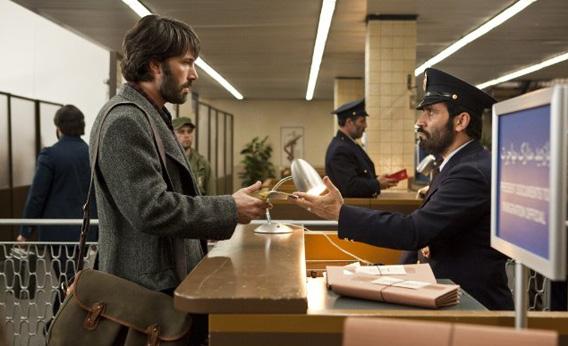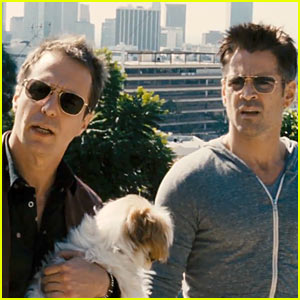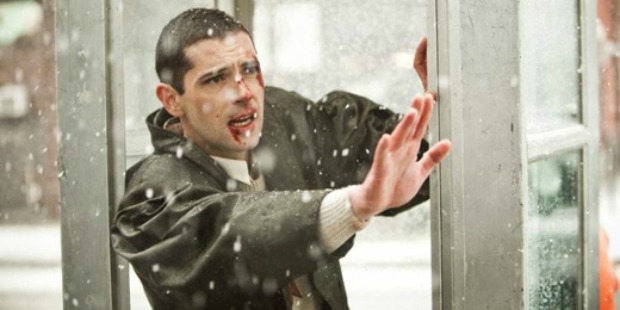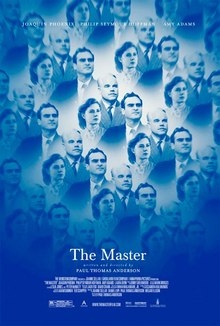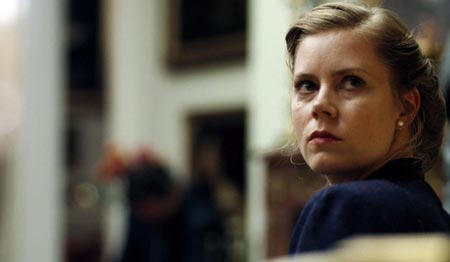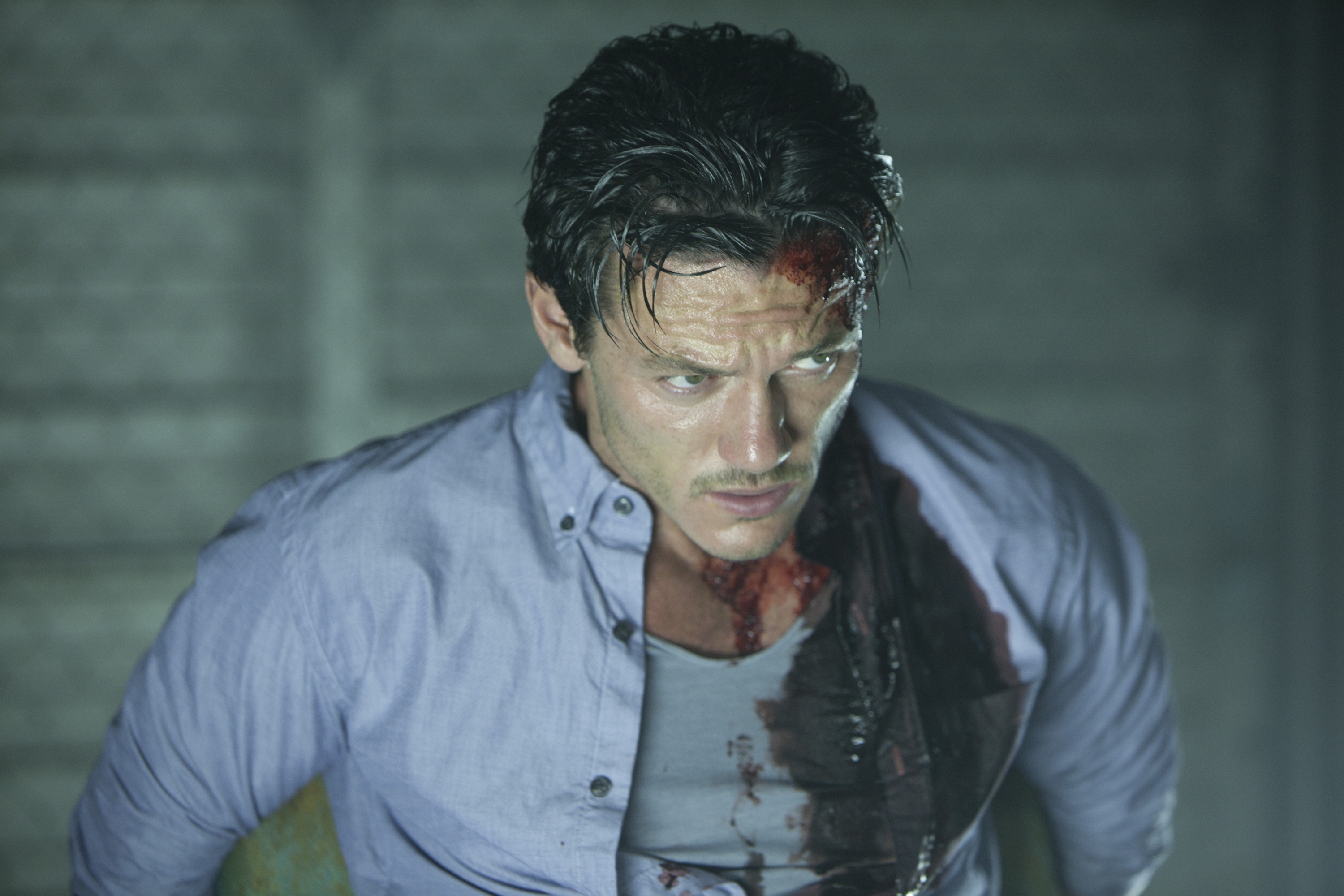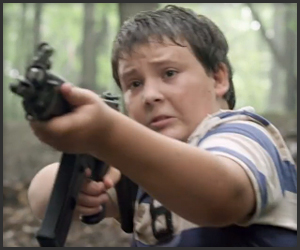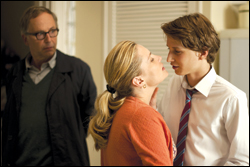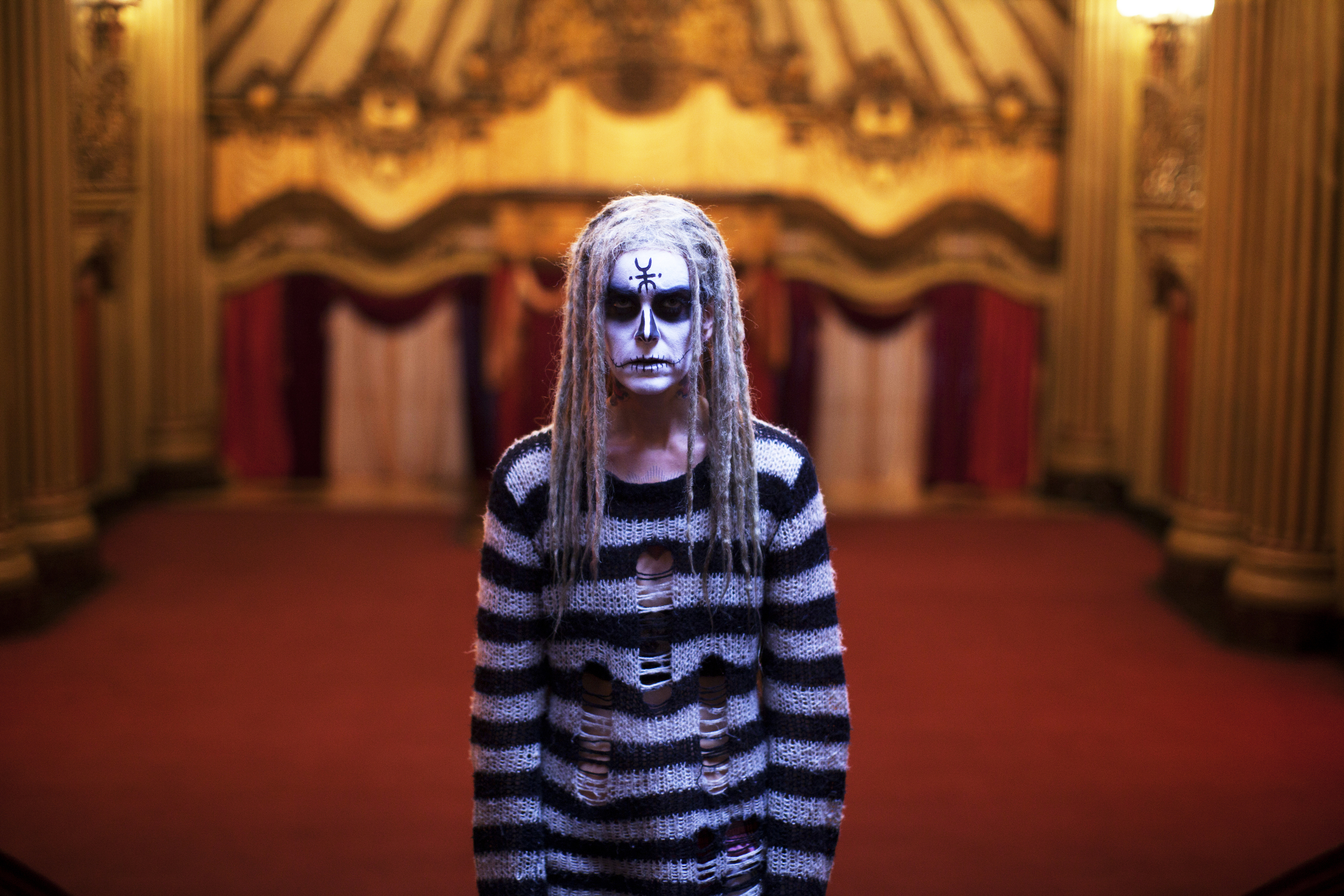Ok, so I’m off to see Laurence
Anyways tonight and still haven’t even finished up my TIFF reviews let
alone got on to The Master. Officially
behind so I’ll try and speed this up as best I can.
The Suicide Shop
This twee cartoon musical from Quebec centers around a town where suicide
is not only legal but a viable industry. The central family, the Tuvaches, have
maintained their store, which sells the means to oneself in, as the
family business since 1854. But youngest child Alan is of a different disposition to the
rest of his morbid family and fellow townsfolk and makes it his quest to share
his optimistic world view with them all.
It's hard to recommend this one as
family viewing given the central theme is suicide and some of the more outré
musical numbers include young Alan and the neighbourhood children spying on his
sister through a window as she dances naked for her own amusement. And yet the
style of the film seems to be going after exactly that market with its clean
simple animation, bubbly little songs and the frankly silly schemes developed
by Alan in his efforts to cheer everyone the fuck up. I guess it’s going for
nostalgia?
To be honest, it’s far too syrupy for me but I don’t think
I’m the target audience here (though I’m clearly struggling to figure out who is) and there were
certainly enough people in the audience satisfied by this confection.
Lunarcy
This documentary about people who are obsessed with the idea
of colonising the moon is an odd duck in that it wants to have its cake and eat
it too… and actually manages to almost pull it off.
As we’ve seen more and more in documentaries recently (or
maybe I’m just seeing more of them), the
genre has opened itself up to playfulness and Lunarcy is never shy about pointing out its own absurdity or that
of its subjects.
And yet, it has a sympathetic vein running through. It
follows three main characters: a young man with Asperger’s syndrome who is
convinced he will be the first permanent resident on the moon; a retiree whose
favourite pastime is figure out what life on the moon would be like in every
facet from real estate to architecture to art; and a middle-aged man who
believe he owns the moon (because the UN never responded to his letter to say
that he doesn’t) and runs a side business selling of acreage to interested
punters.
In each case the film is careful to show both the extreme
nature of their obsession but also to reveal the hidden sadnesses behind that
obsession in a sympathetic light. These character are flawed but it’s hard not
to feel some sympathy and wonder exactly who it is they are hurting with their
passion.
Ultimately it finds inspiration in the young man with
Aspergers, arguing that it is exactly his kind of ambition that got us to the
moon in the first place and that kind of ambition that will be needed if we
really are ever going to get back there.
The Brass Teapot
This indie film from America suffers from that
frustrating feeling that one or two more drafts of the script could have
turned it from something watchable but mediocre to something more solid and
long lasting.
The plot of the film revolves around a young married couple
(played by Michael Angarano and Juno
Temple) living close to
destitution when they come across a magical teapot that spits out cash whenever
they cause pain in its presence. Soon the temptation of the teapot take
them on a descent into darkness as they resort to more and more extreme
measures to keep the cash flow going.
The film struggles a bit with knowing exactly what it is and
what it wants to say and feels like it’s just on the the brink a point it never quite gets to. As a result it contains elements of
several genres without settling on any one of them. It’s a black
comedy, a crime caper, a perils of transformation story (seriously, every plot
point from Can’t By Me Love is in
here, just not with any context) but ends up merely a hodge podge of all.
It’s a shame really, because there’s a lot to like. The
central performances are fairly engaging. Angarano seems to be having a lot of
fun, and Temple
navigates the balance the humour, steel and vulnerability that her complicated
character requires. But, by contrast Alexis Bledel and Alia Shawkat are wasted in
thankless roles that only work because they’re clichés of characters you’ve
seen in other films.
All of that said, there is a vague charm and I hope that
director Ramaa Mosley learns enough from her feature debut to deliver a
stronger product with her next project .
The ABCs Of Death
Collaborative horror anthologies are always tricky to review
given that the different creative teams working on each segment make it hard to
summarize the film as a whole.
That’s greatly exacerbated in The ABCs of Death which features no less than 26 directors, one for
each letter of the alphabet. Yes, the central conceit of ABCs is that there’s a multitude of ways to die and each has its
own character. A is for Apocalypse, B is for Bigfoot etc. etc.
With 26 directors, even for a horror anthology this is a
mixed bag and sadly, about half of them fall short of the mark. Some feel like
a cop out for the genre (M is for Miscarriage is clever but not what we paid
for); others so outlandish they don’t make sense (‘W’ and ‘Z’). In the midst
though there are some shining lights with the truly bizarre ‘F’, the bloody and
creative ‘X’ and the stop motion cartoonish violence of ‘T’).
But ultimately, there was just too much miss for too little
hit for me to recommend.
Student
This Kazakhstani film by acclaimed director Darezhan
Omirbayev starts out interestingly enough as it gently hints at underlying
class struggle in the country but ultimately can’t sustain enough interest in
its own narrative to take this through to anything meaningful.
A modern day update of Fyodor Dostoevsky’s Crime and Punishment, Student loyally sticks
to the main plot points of the classic novel but without Raskolnikov inner
monologue to keep things going, unless you are familiar with the source
material, you’d quickly get lost in the mysterious actions of Nurlan Bajtasov’s
Student (Raskolnikov’s counterpart here) or what even is going on.
Bajtasov’s blank-faced performance does not help in any way
as the Student seems to merely wander through the landscape of his crime
without much real understanding of what he’s done. The crippling guilt of the
on-paper Raskolnikov becomes merely the filmic Student’s sleeping in. The main
character is consistently overshadowed by the rest of the cast (the Razumikhin
stand-in especially) and, in a film where his emotional reaction to what he’s
done is kind of the point, this leaves Student
wandering lost.
Interestingly, they cut the Petrovich subplot from the film
which would seem to be an attempt to make Student’s action motivated more by
guilt than fear but this just doesn’t come across.
Skip it.
7 Boxes
This Paraguayan crime thriller came as a huge surprise to me
but may be the best film I saw at TIFF this year.
Victor (Celso Franco) is a porter in the sprawling market of
Asunción, hoping to make enough money from carting people’s purchases to buy a
new mobile phone with a camera that’s just hit the market (the film being set
in about 2007-2008). When rival porter Nelson is called away to tend to his
newly-mothered wife, Victor is offered a job filling in his usual role and
given the task to transport seven boxes throughout the market and keep them
hidden from police in exchange for a big payday. Of course what the boxes
contain is highly illegal and Victor finds himself pursued by police, gangsters
and an increasingly violently infuriated Nelson seeking to seize the reward for
himself.
The film progresses it descends into increasingly complex
and tense situation as it becomes clearer what is in the boxes and why they
hold the balance in the tense equilibrium of the local underworld. That Victor
has no idea how much deeper he is in than he thought, the tension for the
audience keeps ratcheting up until a devastating climax in the streets of
Asunción.
The film picks up pace very quickly and rarely lets up for
more than a few minutes at a time. Victor is a compelling central character,
brash beyond belief and desperate to be more important than he is. However he is not
without heart, which we see through the growing interest he shows in his
sidekick/potential love interest Liz (Lali Gonzalez). Liz herself is a formidable
opponent to Victor’s more chauvinistic tendencies and the interplay as the balance of power shifts back and forth between them is hugely entertaining.
Interestingly, though the film has clear villains, most
often in the form of Nelson, there’s a sense that not a single one of them has
control of the situation and the abject violence throughout the film is an
expression of desperation rather than of evil. In Nelson’s case, his need to
financially provide for his sick child is a helluva motivator, certainly
trumping Victor’s cell phone (though it is established early that there’s a
long term enmity between them).
The performances of the three leads are impeccable though
Celso Franco is a definite discovery as his version of Victor has to balance a
lot of dark and selfish stuff yet be consistently likeable and Franco has his
hand very firmly on the wheel here.
An absolute delight, directed by Juan Carlos Maneglia and
Tana Schembori.
Thale
A second great film in a row, this Norwegian effort has an
ultra low budget but manages to look high-quality even with a supernatural
theme.
Elvis (Erlend Nervold) has just started working with Leo
(Jon Sigve Skard) in his cleaning business, mopping up homes after a death has
occurred. Though he really doesn’t have the stomach for the bloodstains and the
smell, Elvis desperately needs the money for reasons that become clear as the film progresses.
When the pair are dispatched to clean a cabin
in the woods where the owner has just died, they are surprised to discover
that the home they are expected to air out has a secret trapdoor in it
leading to a dilapidated but well stocked laboratory. Deep within
the lab, they stumble across what appears to be a wild woman who initially greets
them with violence but seems to respond to certain cues. Through
various recordings left in the lab, the pair come to believe that this woman,
named Thale, may in fact be the huldra of Scandinavian lore and are their newfound relationship forces them to reconsider their relationship to the world around them and the limits of their own small lives.
Although the film keeps the truth from Elvis and Leo for
quite a while, we’re tipped off early that Thale is exactly what the tapes say
she is and that she has been the victim/beneficiary of a professor trying to
understand huldra ways and bring her closer to human ways.
The action components of the film stay from here but become
layered with a deeper narrative about the harm we do when we force creatures
out of their natural environment and about how sometimes it’s better to allow
wonders to remain wondrous by not
examining them under a microscope.
It’s a fair simple message but it’s told in such a touching
way that it never feels forced. Flashbacks of Thale’s time with her
jailer/father figure keep us seesawing between whether this man truly cares for
her or merely sees her as a specimen. Her tortured and loving response to both
roles gives a character that never speaks a word a great emotional complexity.
It almost goes without saying to say that Silje Reinåmo as Thale does
an amazing job with a difficult role balancing out the toughness and
vulnerability that a wild captive creature must exhibit. However, neither Nervold
and Skard disappoint; the former with wide-eyed fascination in Thale’s
threat, the latter concealing a vulnerability that doesn’t emerge until much
later in proceedings.
Well worth watching.
Sleeper’s Wake
Probably the nicest thing I have to say about this South
African effort is that the scenery is quite pleasant to look at. Otherwise,
well it never met a cliché it didn’t like and that makes Jack a dull boy
indeed.
Sleeper’s Wake features
John Wraith (Lionel Newton) recovering after a car accident that killed his
wife and child (there’s a lot of that going around apparently). Retiring to a
friend’s holiday house out in the countryside, he is drawn into the lives of
his new next door neighbours – particularly into the sexually aggressive world of
teen daughter Jackie (played by model Jay Anstey).
Of course, it soon becomes clear that Jackie is just as
damaged as John is, and in a far more destructive way. Before John knows it,
he’s pulled deep into a situation there doesn’t seem to be any easy way out of
as Jackie’ mind games and manipulations take him far away from safety.
Yes, it sounds like The
Crush, or Fatal Atttraction, or
any number of the affair-turns-stalking genre. Because it is like all of them.
At least it has baboons as a plot device.
Imogene
A frothy indie comedy featuring Kirsten Wiig, Imogene is a lightly enjoyable yet not
deeply memorable film that keeps the laughs coming but isn’t as thorough in the dramatic department as it might like to
think.
Imogene (Wiig) is a formerly successful playwright whose happy
ensconcement in the upper echelons of New
York society come crashing down when she is dumped by her
more successful boyfriend. Staging a suicide attempt in a dramatic bid to win him back, she is
remanded to the care of her loopy mother Zelda (Annette Bening)
back in the New Jersey that Imogene would rather not think about. Forced back to her
roots and wallowing in despair, Imogene is naturally forced to reevaluate her
life’s value as she entertains new possibilities, including hooking up with
her mother’s sexy new boarder, Lee (Darren Criss).
The real joy in this film is the interplay between Wiig and
Bening as two women with vastly different takes on life. Zelda can’t
understand why Imogene is so uptight and blame her for the detour her life has
taken; Imogene can’t cope with Zelda's lower-brow take on life and how she could
absolve herself of so much responsibility for her upbrining. These two actors
play perfectly off each and the fact that both viewpoints are equally
understandable enables the film to have conflict without either character coming
across unsympathetically.
Less interesting is the wealth of side characters that populate
Zelda’s colourful world, including new lover Matt Dillon, son Larry (Nathan
Corddry) and Larry's prospective girlfriend Allyson (a sorely underused Natasha
Lyonne). You get a sense there’s a lot here just for the sake of being quirky
rather than because it builds story in any way.
Likewise, I’m not sure if it’s the age difference between
them but the putative relationship developing between Imogene and Lee feels a
bit under-heated and his attempts to lead her into freeing herself from self-loathing threaten to be on the nose.
The Relcutant
Fundamentalist
The most negative thing I can say about Mira Nair’s latest
film is that it runs about thirty minutes too long and requires a great time
investment from an audience.
Aside from that, The
Relcutant Fundamentalist is an entirely enthralling and extremely important
film that I worry won’t find much success in the Western world because of its
subject matter.
Long story short, The
Reluctant Fundamentalist uses the story of one man to try and point out how
our extreme reactions to terrorism and the racism that comes with those
reaction may actually push people who would be our allies to turn against
us.
Bobby (Liev Schieber) is an embedded journalist who’s
finally been granted an interview with the charismatic Changez (Riz Ahmed) an
Islamabad-based Muslim leader who is suspected of having ties to recent
terrorist activity.
As Bobby’s interview with Changez continues though, we
flashback to a younger version of the character, an aspiring Pakistani
stockbroker working in America
and wholeheartedly embracing the American Dream. Admired by his boss (Kiefer
Sutherland) for his business acumen and with a burgeoning relationship with
artist Erica (Kate Hudson), Changez can’t imagine a better world. Then,
September 11 happens, and Changez begins to learn how fragile all that
happiness was.
Although Changez is certainly the victim of some rather
offensive racism following the September 11 attacks (most particularly from law
enforcement authorities), Nair is careful not to let the pendulum swing too far
into self-righteousness. Changez's inability to talk about what he’s going
through to the people around him also fuels his simmering anger. In particular,
a scene where he and Erica fight over the racism he perceives in her art is a
heartbreaking. I haven’t been a big fan of Hudson’s since 200 Cigarettes but the misery with which she tries to explain how
she doesn’t understand his resentment goes a long way to underlining what may
be the core message of the film. Hudson
is utterly sympathetic, even as Ahmed is utterly justified.
Nair seems to be underlining how the problem the West has
with Islam is less to do with what most Islamic people actually do and more our
unwillingness, possibly even inability, to see beyond our own cultural context.
In the framing context, Changez is as likeable as he ever was during the NY segments,
albeit with greater gravitas and heightened understanding that Bobby will not understand his life or culture the way Changez himself does.
He’s a deeply charismatic figure as he talks to Bobby and
the reporter increasingly struggles to reconcile the supposed truth of what
he’s hearing with the CIA's speculation about Changez’s involvement in terrorism,
leading to a rather tense climax where Bobby will have to make a decision about
which of these versions of Changez he really believes in.
It gets messy.


